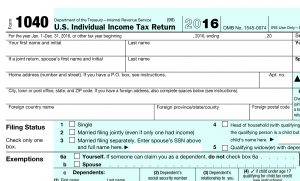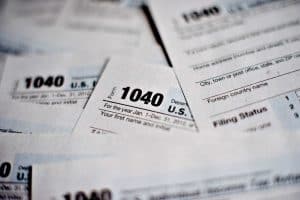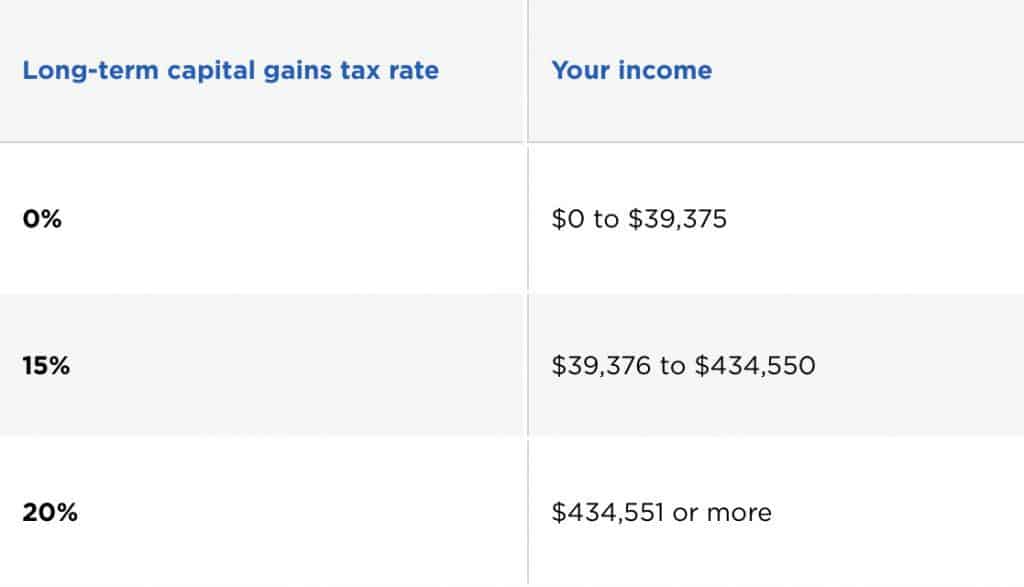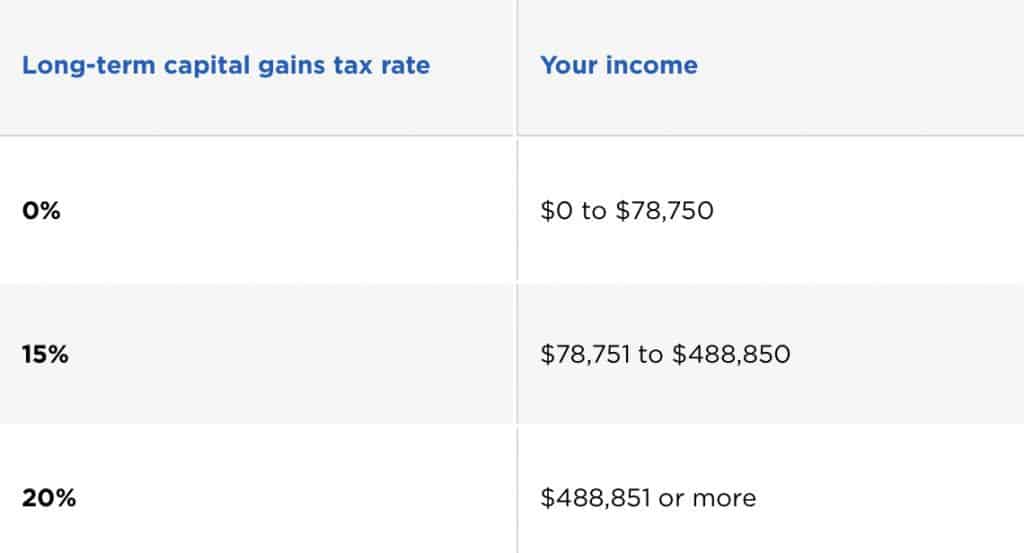Every year tax season creeps up on us then pounces. Quite a few investors have experienced significant gains or losses on their cryptocurrency investments. Many are wondering how these should be handled at tax time. There are a lot of misconceptions about cryptocurrency taxes. Some investors incorrectly believe that investors are not required to be report cryptocurrency transactions. Others may fail to report due to the complexity of the process or possibly choose to ignore the requirements. The Internal Revenue Service (IRS) clarified their position on cryptocurrency as property in March 2014 in publication 2014-21.
The IRS has since updated and clarified tax laws regarding cryptocurrency. It is treated as property, like-kind exchange rules don’t apply.

Since the IRS classifies cryptocurrencies as assets, or property, capital gains realized on sale of these assets are taxable. However, there are exceptions for those with incomes below certain levels. Most believe the IRS expects investors to report transactions involving cryptocurrencies in the same fashion as stock or bond investments. Investors should be aware of increasing attention on cryptocurrencies from numerous governments and regulatory bodies throughout the world.
Exchanges keep records of all trades, deposits, and withdrawals, and blockchain transactions for the most part are public and permanent. Investors choosing to ignore the tax code do so at increasing levels of risk. Creating a sound and legal personal record-keeping and reporting system now can not only help you save money on taxes but also allows you to fully assess trading strategies to maximize gains and can help future-proof your portfolio should regulations change.
For 2019 and in response to the COVID-19 crisis, the US Congress and the IRS enacted emergency legislation to postpone the due date for tax filing to July 15. An extension request can still be made to defer until October 15, but penalties and interest may apply due to underpayment of 2019 taxes before July 15
Start planning early to minimize taxes

Resist the urge to defer tax considerations until the last minute. Start planning for tax season now to take advantage of strategies that can lessen the impacts of taxes on your investment returns. Year-end tax planning can not only help in portfolio reallocation, it is also a great way to employ legal techniques to reduce or eliminate your capital gains tax liabilities. We have more specific tips for filing your returns in this article.
Capital gains taxes are not collected and paid by your employer. They must be calculated and paid by the investor when filing tax returns. Sales resulting in large realized gains may require payment of estimated taxes throughout the year to avoid underpayment penalties. You can read more about this topic on the IRS site in publication 505. In this article, I’d like to address some of the general considerations along with a few tips to keep more money in your pocket.
This article covers US tax law only. It is not meant as specific advice for your own cryptocurrency taxes. Always discuss your situation with an expert if you are unsure of anything.
{Be sure to register for a free account to discuss this article and many other topics.}
Cryptocurrency Capital Gains
As previously noted, the IRS has declared that cryptocurrencies are subject to capital gains taxes. But remember, taxes are only due on those currencies that you’ve sold at a gain relative to your original cost. This means that if you are holding $10,000 of coins for which you only paid $500, you do not yet owe any capital gains.
Should you decide to sell all or part of those coins, you owe tax on the net gain realized from that sale. This realized gain is taxed at rates that are dependent on the length of time the coins were held and your total annual income. Assets owned for less than one year before selling are taxed at the same rate as your ordinary income. Rates can be as high as 39.6%.
Long-term capital gains on assets held for more than one year are lower, ranging from 0-20% depending on income. It is also important to note that there are annual income thresholds used to determine whether or not you must pay capital gains taxes. For individual taxpayers who have a total annual income below $39,375, long-term cryptocurrency gains are not taxable. For married couples, you may have income up to $78,750 before you must pay taxes on long-term capital gains.


2017, 2018 and 2020 brackets and minimum thresholds can be found by checking the IRS page or this helpful set of tables on Nerdwallet. High income investors may also be subject to an additional 3.8% tax on capital gains. Please consult a tax expert or read more on this at IRS Net Investment Income Tax.
Using income thresholds to lower taxes
Note that these income thresholds include money from all sources including capital gains. For example, if you have an annual earned income of $35,000 but you also have over $5,450 in capital gains, you are expected to complete the necessary IRS forms and pay taxes. These income threshold exclusions only apply to long-term gains. Assets held for less than one year prior to sale must be reported. There is no minimum level to avoid paying short-term capital gains taxes. This needs to be factored into any decision to sell an asset.
These thresholds are useful for strategic portfolio tax planning. As the year winds down, you should be able to estimate your final annual income. When deciding whether or not to sell any asset, you should look not only at the length of time held to minimize short-term gain taxes but also which calendar year may be best for realizing any gain.
For example, if it looks like your annual total income for the current tax year will be under the $39,375 or $78,750 thresholds, you may wish to sell before Dec 31 to lock in gains. This would be especially true if you anticipate income growth next year. Keep in mind it probably does not make sense to sell an asset held for less than one year just to have the transaction recorded before year end due to the unfavorable tax treatment of short-term gains.
On the other hand, if you had a particularly good year but don’t expect that to continue, it may make sense to postpone sale of any appreciated assets to shift tax liability into the following year. In that case, you could legally avoid paying any taxes by waiting to realize those gains. Although it may be difficult to predict your annual income a year in advance and there can be wild price swings in cryptocurrencies, these factors deserve consideration to minimize taxes and maximize gains.
Questions or comments? Join our community here.
What does the IRS consider a taxable transaction?
As noted previously, IRS document 2014-21 indicates that cryptocurrency payments, transactions and trades are to be treated the same as taxable transactions or as income if receiving payment(s) in the form of cryptocurrency. Funds received as income must be declared as such on your 1040 as miscellaneous income unless you receive a W-2. Investors should report trades on IRS form 8949, and the total net short-term and long-term gains from that form are used to complete schedule D.
It’s a straightforward process. You can either use your own records or download a report of your transactions from exchanges to reference while completing these forms. Once your taxable totals are determined from Schedule D, they are used to complete your final 1040 tax return. Watch for my follow-up article with step-by-step instructions on completing and filing these forms.
A word about like-kind exchanges and crypto
12/23/17 Update. The recently passed tax plan limits like-kind exchanges to only real estate exchanges. This eliminates the possibility of using like-kind exchanges to defer taxes in crypto to crypto trades. Although this applies for 2018 and forward, it is likely not a good idea to attempt using like-kind exchanges for 2017 or any previous year. You must report like-kind exchanges on form 8824, which notifies the IRS that you’re treating crypto to crypto swaps as like kind exchanges. Should the IRS issue a policy in the future that contradicts this, investors will be on the hook for back taxes and penalties. More on crypto to crypto trades here.
The importance of good records
I’d like to talk about the importance of keeping accurate and complete records of all trades and transfers. Although you can download transaction reports from your exchange accounts, creating and maintaining a personal record-keeping system has many advantages. For investors with only a small number of trades per year, a simple paper ledger or a limited spreadsheet may be all you need.

For advanced or frequent traders, online tools such as CoinTracking and Blockfolio may be of value. Services and features range from basic free accounts to premium subscriptions. No matter what method you choose, just note that you cannot rely on exchanges for good records. Consider that you might use a specific exchange to buy bitcoin but then move it to a different exchange for sells or to buy altcoins. Neither exchange will have a complete record of your trades. Downloaded reports will be fragmented or incomplete. This is one good reason to create and maintain your own system.
For any record system to have utility, it must be regularly updated and reviewed. A poor or incomplete system is of little value. At a minimum, you should record date of trade, type of trade, currencies involved, total proceeds from the sale or cost of the buy, and original cost basis of the asset for sells. Remember to include all transaction fees, transfer fees, and miscellaneous costs in your cost basis.
Should you transfer to your private wallet, calculate the dollar value of the fee paid at the time of transfer. It is also important to note date of the transfer if different from purchase date. Later, if you transfer back to the exchange for a sale and pay additional transfer fees, be sure to record the amount in USD based on price quotes at the time of transfer along with the date. The IRS will accept your good faith best effort when estimating these fees as long as you keep accurate and consistent records.
Use your records to lower cryptocurrency taxes
A good set of records offers many advantages. You can use your trade history when determining not only what and when to sell, but also which specific lots to choose to minimize taxes while maximizing gains. In the event you wish to sell only a portion of your holdings, you will likely want to choose coins held long-term rather than short-term most of the time. But you may also need to match gains and losses, or you might want to liquidate a portion for financial needs while holding the rest of your coins.
The IRS and the exchanges assume that you are using the first-in, first out (FIFO) method of accounting, but this is not mandatory. Choosing to use specific lots (purchases) for sell orders can result in significant tax savings. The only thing needed to use this specific lot method is a personal record noting which coins were chosen for specific sells. You don’t have to notify exchanges to sell specific coins. Note that you cannot switch between FIFO and specific lot methods in the same account, you must choose one method and use it for all subsequent trades in that account involving that specific currency. You can use different methods for each currency in that account, and you may be able to do so in different accounts depending on the strength of your record-keeping system.
Tax advantages of selling specific lots
Consider that you decide you want to cash out $1,000 worth of bitcoin to cover living expenses for the month. You’ve been quite successful at bitcoin investing, having bought regularly from 2014-2017 at lower prices. When you sell, the IRS and the exchange assumes you are selling the first $1,000 worth that you ever bought. This may be the coins that have the highest capital gain. But you may be better off selling $1,000 worth that you bought in mid-2016 if you paid more for those coins to lower your realized gain and minimize taxes. Keep in mind the differences between short-term and long-term gains when choosing which lots to sell.
Remember, you still have all of your other portfolio gains, they are just unrealized at this point and therefore not taxable. In this manner, you can defer paying taxes on those larger gains to future years. Perhaps you have a higher income in the current tax year due to your investing success or a big bonus at work, and you eclipsed the minimum tax thresholds discussed earlier. It makes perfect sense to trade the coins that have the highest cost basis and therefore the lowest tax liability, especially if you expect your income to drop below the thresholds in the following year. On the other hand, if you fall under the threshold in the current tax year but expect to exceed the limits next year, you would likely want to lock in the highest gain now.
Summary on cryptocurrency taxes
Hopefully this article has given you a better understanding of the current laws on capital gains taxes in the US and how these relate to cryptocurrency trades. Since the IRS has clearly stated that investors should treat cryptocurrency trades as property exchanges, investors should be prepared to follow the reporting requirements and pay taxes accordingly.
Complete up-to-date transaction records are helpful not only for reporting but also for implementation of tax reduction strategies to help keep more of those gains in your pocket.
The Cryptocurrency Forums welcomes new members. Be sure to register here for a free account. Check back for more tax tips and advice soon.
Already registered? Discuss this article in the General Section in this tax thread.
The Cryptocurrency Forums is an Amazon Associate. As an associate, we earn from qualifying purchases. We are also an affiliate of Trezor, Ledger, Coinbase, NordVPN, Ezoic, and WPX. Use of affiliate links does not add any cost to the buyer.



